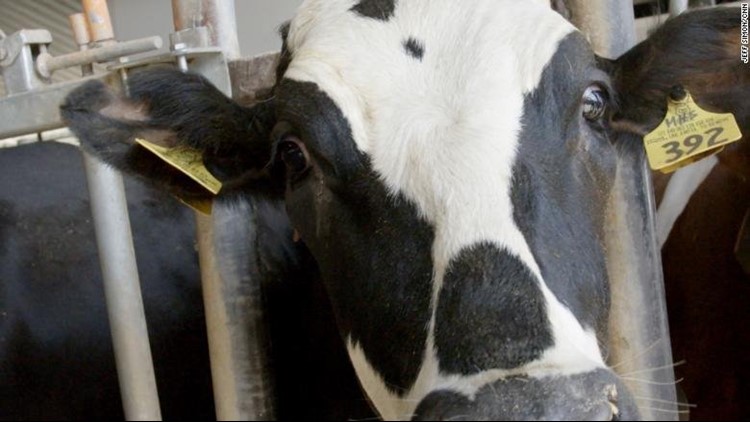An emergency aid package announced this summer was meant to help farmers caught in the crossfire of President Donald Trump’s escalating trade war — but as the midterm elections approach, American dairy farmers say the amount of money they received isn’t cutting it.
A dairy industry group is asking the US Department of Agriculture for additional subsidies, claiming they’ve lost more than $1 billion in revenue since May because of tariffs imposed by China and Mexico in retaliation for steel and aluminum duties.
The USDA made $4.7 billion available to farmers starting in September. About $127 million was allocated for dairy farmers specifically, an amount that makes up for less than 13% of the industry’s losses to date, according to the National Milk Producers Federation.
Trump has pointed repeatedly to his new NAFTA deal as a big win for farmers, calling it a “tremendous victory” at a speech Saturday at a farmer convention in Indiana.
Yet, while it’s true that the Canadians agreed to crack open the door of its market to US dairy farmers, Trump’s administration has tacitly acknowledged that his tariff policies have hurt those same people, who make up a key part of the Republican base.
When the first tariffs went into effect in the spring, Trump himself promised to “make it up” to farmers, calling them “patriots” and insisting the policies would be better for them in the long-run.
The aid package “had political motivations,” said Andrew Novaković, a professor of agricultural economics at Cornell University. But “I think there was a genuine understanding that these actions exacted a real cost on folks who were important supporters of the long-term agenda.”
Fourth-generation Wisconsin dairy farmer Pete Kappelman said he still believes Trump has his back. He milks 450 cows in Manitowoc at his family-operated Meadow Brook Dairy Farms. Three of his children and one son-in-law recently joined the business.
Kappelman, who voted for Trump, pointed to the aid package as evidence that the administration is providing “air cover” for farmers while the president wages his trade battle, but admitted, the payment he’ll receive won’t cover more than 10% of his losses this year.
It’s uncertain if more assistance is on the way. On Friday, a USDA spokesperson told CNN that it is “actively monitoring the trade situation and will determine in the near future the possibility of additional payments.”
Kappelman said he’s seen many Wisconsin farms shut down this year, and that they’re facing the fourth year of a downward cycle.
“If we don’t continue to get cover from the administration and lose too many American farmers — who Trump has called patriots — in the process, that will seriously erode his support from rural America,” he said.
In truth, the tariffs are only one of a number of problems farmers are facing. Global milk prices are low, consumption is below trend and production is above trend.
“Tariffs aren’t even close to the biggest thing affecting the dairy market,” Novaković said.
Farmers have lobbied the government to pursue new trade opportunities in Asia, as well as address geographical indications policies that limit who can use certain product names, like “parmesan” cheese, for example, to those producers in a certain region.
But tariffs are in Trump’s control, and the aid package is the one avenue of relief these farmers have against tariffs imposed by foreign countries in retaliation.
If those tariffs remain in place, “significant income losses will continue,” wrote Randy Mooney, chairman of the National Milk Producers Federation, in a letter sent last week to USDA Secretary Sonny Perdue.
Trump has not indicated that he will lift the tariffs on steel and aluminum, or the tariffs on $250 billion of Chinese goods anytime soon.
“After decades of economic abuse, we are finally fighting back as a country. We’re not going to take it anymore,” Trump said Saturday.
The strategy pleases a lot of farmers who feel that other countries have engaged in unfair trade practices. The new NAFTA, known as the USMCA, is viewed as moving in the right direction.
For years, the dairy industry lobbied the government to put pressure on Canada, which puts tariffs on dairy products that exceed the quotas, ranging from 200% to 300%.
Under the new deal, Canada will set new quotas, allowing American farmers to sell more milk, cheese and other dairy products north of the border. It also agreed to end a pricing system that limited imports of certain milk ingredients.
But the dairy industry has said the gains made by the USMCA are “incremental.” And a Chicago Fed Beige Book survey recently said that the gains are “too small and too far in the future to help dairy farmers.”
Plus, it’s unclear if and when the new deal will go into effect. Trump and his Mexican and Canadian counterparts are expected to sign the deal by the end of November. It will then be up to Congress to approve the deal, which is likely to come up for a vote next year.
In Wisconsin, which produces more milk than any other state besides California, lawmakers have had a mixed reaction to Trump’s tariffs.
Governor Scott Walker has considered the USMCA agreement a victory.
“This president never forgot his promise to the dairy farmers of the state of Wisconsin,” Walker said last week while standing beside Trump at a rally.
Walker, a Republican who’s up for re-election in November, posted to Twitter that he gifted the president a “Make Dairy Great Again” hat to thank him for sticking up for Wisconsin’s farmers.
His opponent, Democrat Tony Evers, has said that Trump’s tariff war is making things worse for Wisconsin farmers. When the aid program was first announced, Evers said “that doesn’t cut it with me.”
Both of Wisconsin’s US senators, Republican Ron Johnson and Democrat Tammy Baldwin, have been critical of the president’s tariff policies.



